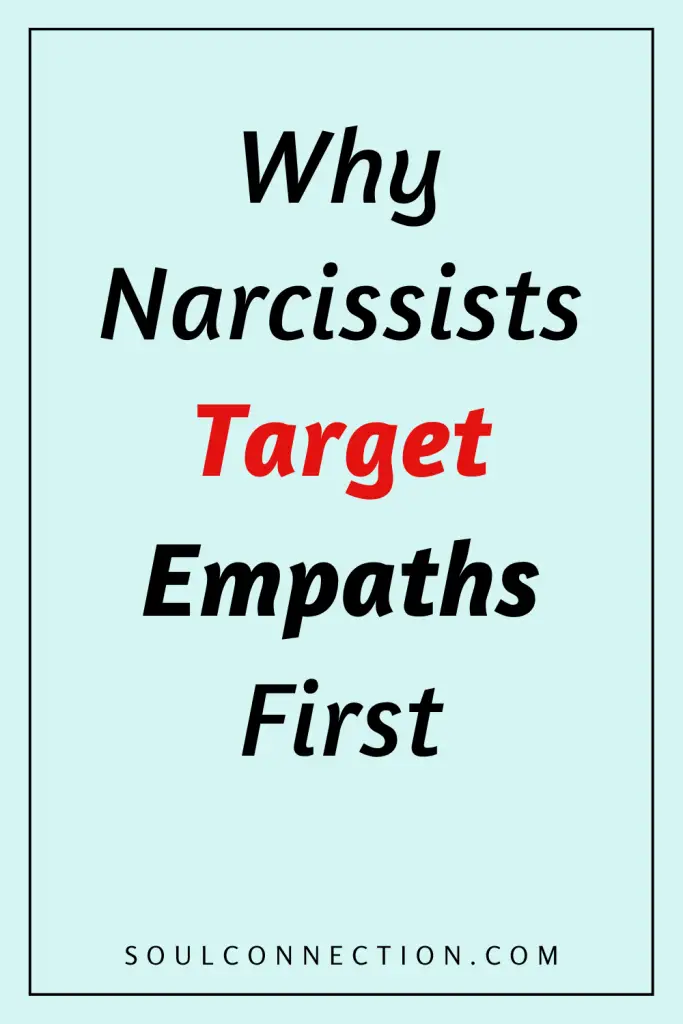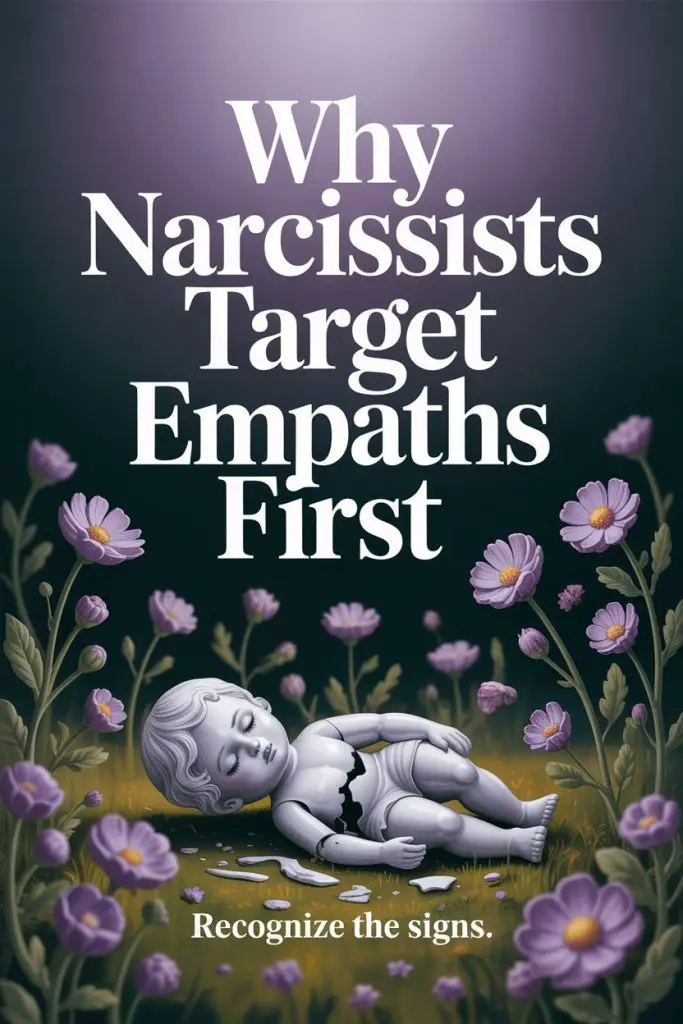Not all love stories are written in the stars. Some are scribbled out in red flags and emotional chaos.
If you’ve ever wondered why it seems like narcissists sniff out empaths faster than a bloodhound on bacon, you’re not alone. This dynamic isn’t random—it’s a psychological tango between two wildly different dancers.
Let’s pull back the curtain on this magnetism, armed with empathy, wit, and a hefty dose of real talk. By the end, you’ll spot the patterns, sidestep the pitfalls, and maybe even give your boundaries a well-deserved polish.
The Empath’s Glow: Why Empaths Are Catnip for Narcissists
Empaths have an emotional glow that stands out like a neon pub sign on a rainy night. They’re caring, intuitive, and have an almost supernatural knack for feeling what others feel.
If someone’s sad, the empath picks up on it before the tears even start.
This emotional radar is a blessing—unless a narcissist is on the prowl. Imagine a narcissist as a heat-seeking missile, programmed to find and attach to the warmest, brightest soul in the room.
The empath’s compassion, patience, and willingness to listen are irresistible qualities for anyone who craves constant validation and emotional support—but doesn’t offer much in return.
Narcissists Crave Validation, Empaths Give It Freely
A narcissist’s self-esteem is like cheap Wi-Fi: always cutting out, never enough, and forever in need of a boost. They need someone to admire them, mirror their feelings, and make them feel like the main character in every scene.
Empaths, meanwhile, hand out emotional reassurance like it’s Halloween candy. Compliments, encouragement, active listening? All in a day’s work.
A narcissist steps in and thinks, “Finally, someone who sees my greatness—and doesn’t even ask for anything back!”
It’s not that empaths are lacking boundaries on purpose. They genuinely want to help, to heal, to make the world a touch softer for everyone around them.
Unfortunately, narcissists see this generosity as a golden ticket to unlimited ego snacks.
The Illusion of Deep Connection
In the early days, it can feel like a soulmate situation. The narcissist showers the empath with attention—grand gestures, intense declarations, maybe even quoting a bit too much Rumi. It’s intoxicating.
What’s actually happening? The narcissist is mirroring the empath’s values, interests, and emotional tone. It’s not genuine connection; it’s the emotional equivalent of a knockoff designer handbag.
The empath, sensing this “deep bond,” leans in, unknowingly fueling the narcissist’s need for control and admiration.
It’s a masterclass in manipulation. The narcissist becomes whatever the empath wants—until they don’t.
Empaths Are Less Likely to Walk Away Quickly
Empaths hold onto hope like it’s the last biscuit in the tin. They believe that beneath the grandiosity or coldness, there’s a wounded soul just needing a bit of love and understanding. Cue the violins.
This level of compassion is beautiful in the right relationship. With a narcissist, it means staying long past the expiration date, trying to fix, heal, or “love hard enough” to change the dynamic.
Spoiler: it rarely works.
Narcissists know this. They bank on the empath’s loyalty and optimism. If you’re always looking for the silver lining, you’re less likely to notice when the clouds turn toxic.
The Perfect Energetic Feedback Loop
Empaths absorb energy. Narcissists project it—usually with the emotional subtlety of a jackhammer. Put them together, and you’ve got a feedback loop that keeps both locked in a dance of highs and lows.
When the narcissist is up, the empath feels validated, needed, maybe even special. When the narcissist is down (read: sulking, stonewalling, or lashing out), the empath often accepts blame or tries to fix things.
This cycle drains the empath, but the narcissist thrives on the emotional drama.
Exhausting? Absolutely. Hard to escape? You bet. But recognizing the pattern is the first step out of the funhouse.
Empaths Self-Blame While Narcissists Shift Blame
When things go south—and they will—the narcissist becomes a master magician, making their faults vanish and reappear squarely on the empath’s shoulders. Gaslighting, guilt trips, and twisted logic are all part of the show.
Empaths, with their heightened sense of personal responsibility, are more likely to internalize this blame.
“Maybe I’m too sensitive. Maybe I misunderstood. Maybe I need to try harder.” Meanwhile, the narcissist is already planning the next trick.
This emotional sleight-of-hand keeps the empath stuck, doubting their own perceptions, and trying to solve problems that aren’t really theirs.
The Cycle of Idealization and Devaluation Hooks Empaths
What starts as infatuation can quickly turn sour. Once the narcissist feels secure, the adoration turns to criticism, stonewalling, or emotional withdrawal.
Empaths remember the “honeymoon” stage and work overtime to get it back. The narcissist doles out crumbs of affection just often enough to keep hope alive.
It’s like playing the slots at a casino—you win just often enough to keep pulling the lever.
This cycle of idealization and devaluation creates a powerful addiction. Empaths, wired for connection, keep chasing the high. Narcissists, meanwhile, enjoy being at the controls.
How to Break the Spell—Practical Advice
Recognizing you’re in this dynamic is the first gut-punch. What comes next actually matters more: what you do about it.
Start with boundaries. Yes, that word therapists say so much it’s almost lost all meaning—but it’s your shield. Decide what’s okay, what’s not, and stick to it, even when it feels awkward or “mean.”
You’re not being cruel. You’re protecting the one person you know for sure is worth defending: yourself.
Learning to trust your own perceptions—especially after a period of gaslighting—can feel like getting out of a funhouse mirror maze.
Surround yourself with people who ground you. Keep a journal of events and feelings to spot patterns over time. And if you find yourself explaining, justifying, or apologizing constantly, hit pause. That’s a big red flag waving.
Seek support if you need it. Friends, family, or a good therapist can help you see what’s real and what’s smoke and mirrors.
Self-care isn’t just bubble baths and silly sitcoms (though those are nice). It’s about reconnecting with yourself, remembering your strengths, and rebuilding your own life outside the narcissist’s orbit.
Learning to Say No Without a Side of Guilt
Empaths hate disappointing people. It’s practically written in their DNA. Narcissists, on the other hand, treat “no” like a dare they’re determined to overcome.
Practice saying no, even in small ways. “No, I can’t cancel my plans to meet you at the last minute.” “No, I’m not comfortable with that.”
The world won’t end, your empathy won’t shrivel up, and you’ll discover a quiet, fierce power you didn’t know you had.
It’s okay to put yourself first. In fact, it’s necessary—especially when your kindness is being used as a doormat rather than a gift.
Rewriting Your Narrative
You are not the sum of someone else’s needs, demands, or criticisms. You’re allowed to have limits. You’re allowed to walk away. And you’re allowed to expect respect, reciprocity, and emotional safety—not just crumbs.
The narcissist targeted you because of your empathy, not because you’re weak or naïve. Your compassion, sensitivity, and intuition are strengths.
Learning where to direct them—and where to hold them back—will change every relationship you ever have.
If you’re an empath, you don’t need to harden your heart or become suspicious of every new face. Just keep your eyes open. Trust the small signals.
And remember: empathy is a superpower. Use it wisely, and you’ll attract people who genuinely value your light.
How Empaths Can Shine Brighter Without Getting Burned
Drawing healthier boundaries doesn’t dim your empathy—it keeps it burning bright for those who deserve it.
Reclaim your energy, trust your instincts, and step out of cycles that never serve you. A relationship shouldn’t leave you questioning your worth or scrambling for scraps.
The right people will never leave you wondering if you’re “too much” or “not enough.”
Narcissists may always seek out the warmest hearts in the room—but you get to decide who sits at your table.
Back yourself. The rest will fall into place.


